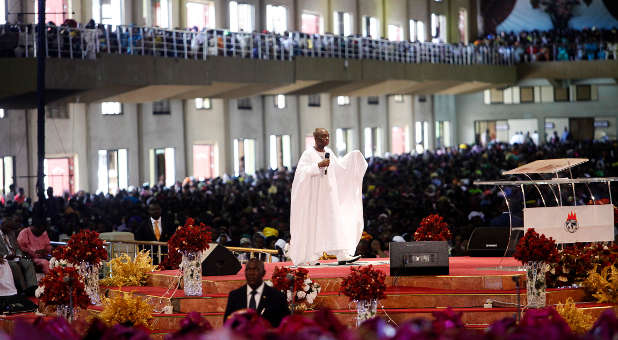When a guesthouse belonging to one of Nigeria’s leading Christian pastors collapsed last month, killing 115 mostly South African pilgrims, attention focused on the multimillion-dollar “megachurches” that form a huge, untaxed sector of Africa’s top economy.
Hundreds of millions of dollars change hands each year in these popular Pentecostal houses of worship, which are modeled on their counterparts in the United States.
Some of the churches can hold more than 200,000 worshippers and, with their attendant business empires, they constitute a significant section of the economy, employing tens of thousands of people and raking in tourist dollars, as well as exporting Christianity globally.
But exactly how much of Nigeria’s $510 billion GDP they make up is difficult to assess, since the churches are, like the oil sector in Africa’s top energy producer, largely opaque entities.
“They don’t submit accounts to anybody,” says Bismarck Rewane, economist and CEO of Lagos consultancy Financial Derivatives. “At least six church leaders have private jets, so they have money. How much? No one really knows.”
When Nigeria recalculated its GDP in March, its economy became Africa’s biggest, as previously poorly captured sectors such as mobile phones, e-commerce and its prolific “Nollywood” entertainment industry were specifically included in estimates.
There was no such separate listing for the “megachurches,” whose main source of income is “tithe”, the 10 percent or so of their income that followers are asked to contribute.
As the churches have charity status, they have no obligation to open their books, and certainly don’t have to fill in tax returns—an exemption that is increasingly controversial in Nigeria, where poverty remains pervasive despite the oil riches.
The pastors argue their charity work should exempt them.
“We use the income of the church to build schools, we use the income of the church to serve the needs of the poor,” David Oyedepo, bishop of the popular Winners Chapel, told Reuters in an interview. “These are nonprofit organizations.”
Pastors on Forbes List
Nonetheless, the surging popularity of the megachurches among the Christians who make up half of Nigeria’s 170 million population has propelled their preachers into the ranks of the richest people in Africa.
In 2011, Forbes magazine estimated the fortunes of Nigeria’s five richest pastors. Oyedepo topped the list, with an estimated net worth of $150 million.
He was followed by “Pastor Chris” Oyakhilome of Believers’ LoveWorld Incorporated, also known as the Christ Embassy and popular with executives and politicians, at $30 million to $50 million.
TB Joshua, pastor of the Synagogue Church of All Nations, at the center of the recent diplomatic storm over the deaths in its guesthouse, was thought to have between $10 million and $15 million.
The National Bureau of Statistics (NBS) declined to comment on how churches fit into their GDP figures, but a source there said they were included as “nonprofit,” which falls under “other services” in the latest figures. In 2013, the category contributed 2.5 percent of GDP, the same as the financial sector.
A former banker at Nigeria’s United Bank for Africa, who declined to be named, recalled being approached five years ago by a church that was bringing in $5 million a week from contributions at home or abroad.
“They wanted to make some pretty big investments: real estate, shares,” he said. “They wanted to issue a bond to borrow, and then use the weekly flows to pay the coupon.”
In the end, he said, the bank turned down the proposal on ethical grounds.
Yet Nigerian churches do often invest large amounts of their congregations’ money in shares and property, at home and abroad, he and another banking source said.
One pastor bought 3 billion naira ($18 million) worth of shares in the defunct Finbank, which later merged with FCMB, after it was rescued in a bail-out in 2009, a fund manager who handled the deal told Reuters. The pastor used a nominee trust account to keep his name off the books.
In 2011, Oyakhilome was investigated by the Economic and Financial Crimes Commission (EFCC) and charged with laundering $35 million of contributions to his church in foreign bank accounts. He denied all wrongdoing, and the case was dismissed for lack of evidence.
Oyakhilome was not available for comment, and Joshua’s media team declined a request for an interview with him…Read More
Source and Original Content by CHARISMA NEWS
